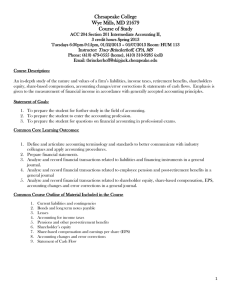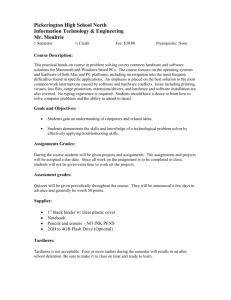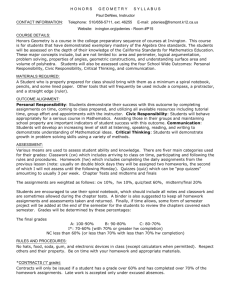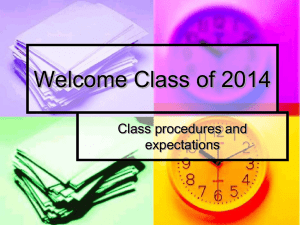Course Description for PASS English (ENG 094)
advertisement
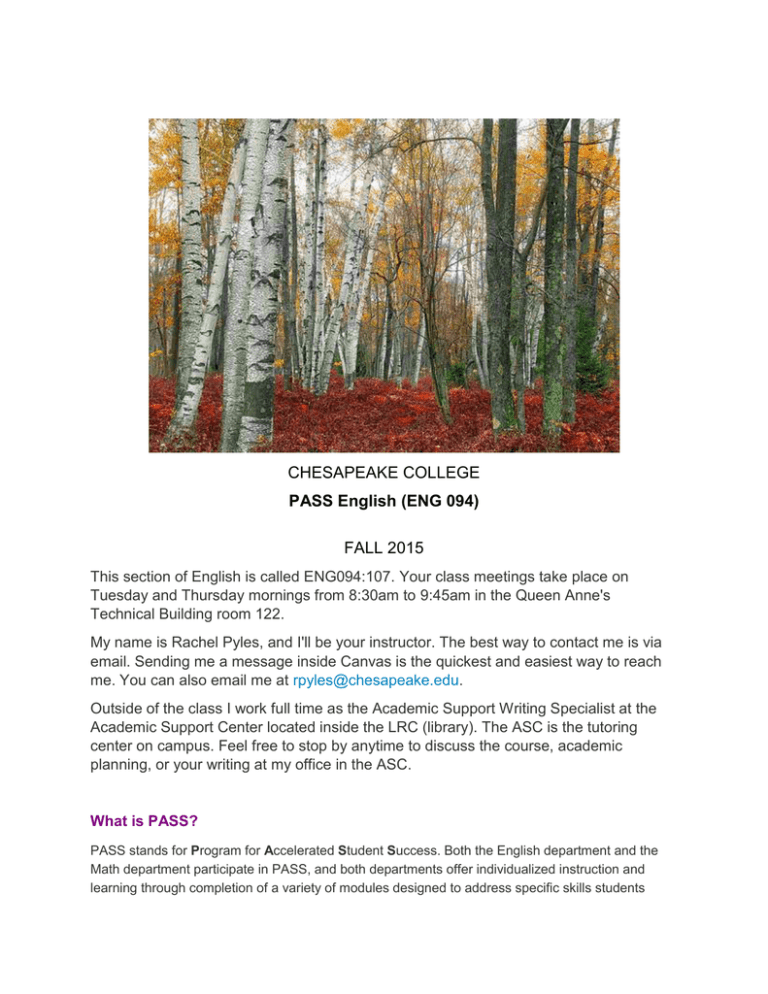
CHESAPEAKE COLLEGE PASS English (ENG 094) FALL 2015 This section of English is called ENG094:107. Your class meetings take place on Tuesday and Thursday mornings from 8:30am to 9:45am in the Queen Anne's Technical Building room 122. My name is Rachel Pyles, and I'll be your instructor. The best way to contact me is via email. Sending me a message inside Canvas is the quickest and easiest way to reach me. You can also email me at rpyles@chesapeake.edu. Outside of the class I work full time as the Academic Support Writing Specialist at the Academic Support Center located inside the LRC (library). The ASC is the tutoring center on campus. Feel free to stop by anytime to discuss the course, academic planning, or your writing at my office in the ASC. What is PASS? PASS stands for Program for Accelerated Student Success. Both the English department and the Math department participate in PASS, and both departments offer individualized instruction and learning through completion of a variety of modules designed to address specific skills students need to be successful in college-level courses at Chesapeake College, allowing students the opportunity to progress at a faster pace. Course Description for PASS English (ENG 094) Students will receive comprehensive instruction in college preparatory reading and writing skills, including essay construction and development, comprehension, summary and analytical reading skills, critical reading, and more. Three-six hours lecture per week. PASS English Outcomes 1. Apply college reading skills to summarize a variety of texts. 2. Apply critical reading skills to respond to a variety of texts: combine information from the texts with student opinions. 3. Compose written products that connect a thesis statement/topic sentence with topic sentences/supporting sentences to (a) organize the written products and (b) refer back to the given assignment. 4. Compose written products that effectively use relevant details to support the thesis statement and topic sentences. 5. Produce material that reflects some use of writing process strategies: brainstorming, essay skeleton creation, outlining, drafting, revising, editing, and proofreading. 6. Use various technologies as required to produce coursework. 7. Compose and revise documents that are generally free of the errors specified in each module. Overview of PASS English Modules Module 1: Tools of the Trade This module’s focus is technology, specifically as it applies to student success in PASS English and beyond. This module meets outcomes 6 and 7. Module 2: Summary & Citation This module’s focus is reading and reporting what others say and citing sources in MLA format. This module meets outcomes 1, 5-7. Module 3: Entering the Conversation This module's focus is reading and responding to texts. The text for this module is Sherman Alexie's novel The Absolutely True Diary of a Part-Time Indian. This module meets outcomes 2-7. Module 4: The Portfolio This module’s focus is revision and self-assessment. This module meets outcomes 1-7. Required Materials Alexie, Sherman. The Absolutely True Diary of a Part-Time Indian. (Any edition will do.) supplemental texts provided by your instructor (in Canvas) Internet access* o Your assignments are preloaded into Canvas, and you will need to be able to access them when you're not in class. If you do not have internet at home, there are computers on campus students can use on a first-come-first-serve basis; keep in mind that you will need to factor this into your workload and schedule. Succeeding in PASS English Students will not receive traditional grades in this course, as mastery is determined by quality of work and meeting course outcomes, not effort or accumulation of arbitrary points. Only students who master all four modules will exit PASS English. Students who do not master all four modules will need to sign up for ENG 094 in Spring 2016 WHAT TO EXPECT THIS SEMESTER Good Faith Effort As a Chesapeake College student, you are expected to spend two hours on your coursework outside the classroom for every hour you spend in the classroom. Some assignments may require more time. Students who do not work outside of class generally do not finish the coursework, so it's safe to say that one cannot exit the program unless s/he puts in the necessary work outside of class. Attendance Expectations You are enrolled at an institution that expects you to be present for class every day. That being said, you are allowed three absences, no questions asked. Upon your fourth absence, your instructor will talk to you about your progress and status in the course and will let Advising, Financial Aid, and the Developmental Studies Case Manager know. It is a simple fact that the more a student misses class, the less likely he or she will be successful in his/her courses. If your attendance becomes intermittent, an appointment to speak to the Dean, the Vice-President of Student Services, and/or the Vice-President of Academic Affairs may be required. This is to make sure you're given every opportunity to be successful in college. Participation in Class Activities You are expected to participate in reading (sometimes aloud), writing, discussion, and collaborative activities in class. Your participation is non-negotiable, as your instructor needs to be able to assess your progress in this course. Unless you are physically unable to talk, you are expected to participate. Student Code of Conduct As a Chesapeake College student, you are responsible for knowing and abiding by the Student Code of Conduct. Instances of academic dishonesty, classroom disturbance, harassment, or any behavior not befitting a college student as outlined in the Chesapeake College Student Guide will be reported. The Writing Process/Revision Your English instructors believe that you learn just as much from the writing process, or steps, involved in writing as you do from producing a final product/paper. You may be accustomed to writing your papers from start to finish in an evening in order to submit them the next day. You may even have had great success in high school or in your workplace completing writing using this particular plan. Those days are over. Every writing assignment is different, and so, every assignment will require its own plan. Regardless of the plan required, the vast majority of college writing requires that you break the writing process into steps, and revise, or rewrite, your work. When instructors ask you to rewrite, it does not mean that you are a bad writer or that you are doing poorly. It means that we are holding you to college-level standards and want you to succeed in your efforts at written communication. Your instructors will guide you through this piece of the process with encouragement and feedback. Taken seriously, this encouragement and feedback can really help you make visible improvement. Midterm Grades At midterm, students will receive one of two grades that illustrates their progress in their courses: S or U. An S grade means the student is making satisfactory progress in the course. A U grade means the student is making unsatisfactory progress and is, at the moment, behind schedule for course completion. A U grade could also mean the student has too many absences or is not performing at a high enough level to be successful. A U grade in PASS ENGLISH means you need to meet with the instructor to discuss ways you can successfully complete the course. As a rule, any student who has not successfully mastered two modules by midterm is in the Unsatisfactory range. Final Grades Final grades will be posted on CRAB at the end of the semester. Only the students who successfully meet the exit criteria for ENG 094. A grade of A, B, or C means the student has passed ENG 094. A grade of C or better in ENG 094 is required to exit the developmental English program. D Grades: Students enrolled in PASS English for the first semester could receive the grade of D as a final course grade. A final grade of D is not a passing grade. It is given to students who have made suitable progress but have not successfully completed their course(s). A student who receives a D will need to re-enroll in PASS the following semester. Remember, a final grade of D is an indication that you are working hard and making progress, and a D can be assigned only under the following conditions: You may receive a D grade if you have mastered Modules 1 & 2. This means you have written three summaries at a two level according to the rubric. Note: You may receive a D grade only once. If you do not successfully complete the course the following semester, you will receive an F. CAMPUS RESOURCES (LINKS) TO HELP YOU SUCCEED Academic Support Center (ASC) Learning Resource Center (LRC) CAMPUS EMERGENCY WEATHER PROTOCOL: In the event that Chesapeake College needs to close for an extended period of time due to a severe weather event or other emergency situation, consideration will be given to the timing and duration of closure as follows: a. Closure during the semester for up to one week: there will be an opportunity to make up work without significant alteration to the academic calendar. b. Closure extending beyond one week (or in situations where classes are cancelled on the same days/evenings over multiple weeks), the college may extend the semester. Depending on the timing of the closure, scheduled breaks, closure dates, and/or the processing of final grades might be impacted. Students may inquire about closures by checking on the college website or by calling 410.822.5400 or 410.228.4360. Chesapeake College courses held off campus will follow the protocol of the host facility. Department of Education Guidelines for Time on Task The Department of Education requires that instructors document how much time students must spend each week outside the classroom on tasks for each course they take. Students in PASS English have a variety of skill levels, particularly in reading and writing, so I cannot provide you with the exact number of hours you need to devote to this course in order to be successful. However, I can make an approximation. Please see the table below for the recommended minimum amount of time you will need to devote to this course in addition to the time you spend in class. Module/Week Module 1 Weeks 1-2 Assignment Details Breakdown of Individual Assignments & Approximate Total Time on Task* 1. Technology Assignment 1. 1 hour 2. Email to Instructor 2. 1 hour 3. How to Format Assignments 3. 2 hours 4. MLA Assignment 4. 2 hours Approximate Time on Task PER WEEK OUTSIDE OF CLASS* 3 hours 1. Reading Module 2 Weeks 3-6 1. Reading Assignment/3 Articles 2. Develop an Annotated Bibliography Article 1: 6 hours; Article 2: 6 hours; Article 3: 6 hours 9.5 hours 2. Writing: 6 hours per summary Module 3 1. Synthesize and interpret 1. Reading: 40 ideas from one article and the novel, The Absolutely True Diary of a hours Part Time Indian 12.5 hours Weeks 7-10 2. Construct an argumentative essay about the text and support it through 2. Writing & Process: 10 hours development, organization, and textual evidence. 1. Create an Outcomes-Based Reflection of at least five paragraphs, arguing why and how the outcomes of the course have been mastered, Module 4 making specific reference to the documents chosen for the final Week 11-14 portfolio. 1. Reading: 2 hours; Writing & Process: 12 hours 4.5 hours 2. Revision of Mods 2 & 3: 4 hours 2. Create an Outcomes-Based Portfolio by revising previous work according to Essay Rubric. In short, a student should expect to devote approximately 7.5 hours per week outside of class on their assignments for PASS English. Depending on one's skill level, some assignments may require more time; some assignments may require less time. *These times are approximate and do not reflect multiple drafts or revisions required for mastery.
